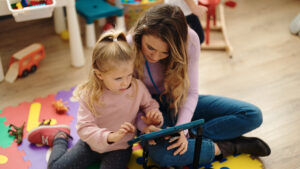An “overload of smartphones and computer screens is creating an epidemic of disconnection” that disrupts family life, the Princess of Wales has warned in a new essay.
The essay, The Power of Human Connection in a Distracted World, was written in collaboration with Professor Robert Waldinger from Harvard Medical School for the Royal Foundation Centre for Early Childhood and based on research evidence from a study that began in 1938.
The study followed thousands of people from their teens through their eighties and nineties, examining data from each decade of life to predict who would stay healthy and live longest. It revealed that the strongest predictor of a long-lasting, healthy life is the quality of connections to other people – warmer, more meaningful connections contributed to a longer, healthier life.
In the essay, the Princess of Wales says that young children need to be encouraged to develop the social and emotional skills that will help them throughout their lives, but that technological distractions can prevent this:
“While new technology has many benefits, we must also acknowledge that it plays a complex and often troubling role in this epidemic of disconnection. While digital devices promise to keep us connected, they frequently do the opposite. Our smartphones, tablets, and computers have become sources of constant distraction, fragmenting our focus and preventing us from giving others the undivided attention that relationships require. We sit together in the same room while our minds are scattered across dozens of apps, notifications, and feeds. We’re physically present but mentally absent, unable to fully engage with the people right in front of us.
“This technological interference strikes at something fundamental: our undivided attention is the most precious gift we can give another person. Yet, increasingly, it’s the most difficult gift to offer. When we check our phones during conversations, scroll through social media during family dinners, or respond to e-mails while playing with our children, we’re not just being distracted, we are withdrawing the basic form of love that human connection requires.
“The challenge is particularly acute for today’s babies and young children who have been born into a world immersed in digital technology.
“Neuroscience has shown us that early childhood is the golden opportunity to build strong foundations for future life outcomes. Pregnancy to the age of five is the fastest and most profound period of brain development in our lives, with an astonishing 1,000,000 new neural connections being formed every second. The brains of babies and young children are at their most malleable and open to change, as they constantly adapt to their interactions with the outside world.
“Children who are raised in environments rooted in love, safety and dignity are better able to develop the social and emotional scaffolding required to form healthy relationships, resolve conflict and grow into adults capable of building loving partnerships, families and communities themselves.
“Ultimately, by nurturing the development of social and emotional skills in early life, we will be equipping children with the capacity to love and be loved. These skills will influence their success far more than academic achievements alone, and will touch every part of their lives, from how they form friendships, to how they raise their own children, to their values and the decisions they make. Honing these skills could be transformative as we look to the future and imagine a very different world.”


